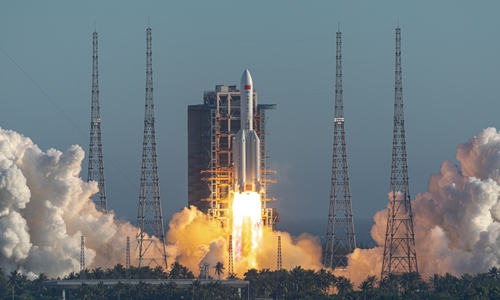Trump administration’s ‘Artemis Accords’ expose political agenda of moon colonization, show Cold War mentality against space rivals: observers

Carrying a trial version of the new-generation manned spaceship and an inflatable cargo return testing chamber, the Long March-5B launch vehicle blasts off from the Wenchang Space Launch Center on the coast of South China's Hainan Province 18:00 on Tuesday. Photo: Shi Yue
Will the space sector, especially the exploration of the moon, become the next major field of competition between China and the US?
As China successfully completed the maiden flight of its strongest Low Earth Orbit (LEO) carrier rocket the Long March-5B on Tuesday, marking a milestone in its manned space projects, media reported that the US Trump administration is drafting a legal blueprint for mining on the moon, proposing "safety zones" surrounding future moon bases in a bid to prevent damage or interference from rival countries and companies.
According to the Reuters report on Wednesday, citing sources familiar with the draft pact, codenamed "Artemis Accords," US officials planned to formally negotiate the accords with "like-minded" space partners in the coming weeks such as Canada, Japan, European countries as well as the United Arab Emirates.
Chinese observers noted that this US-led accord shows the apparent political agenda of the US.
The US is developing a new space version of an "Enclosure Movement," in pursuit of colonization and claiming sovereignty over the moon, said Song Zhongping, a military and aerospace expert.
The Trump administration is excluding Russia, its major partner with NASA in the International Space Station, as an early partner in early talks concerning the accords, the report said, "as the Pentagon increasingly views Moscow as hostile for making threatening satellite maneuvers toward US spy satellites in Earth orbit."
The US-led agreement is emblematic of NASA's growing role as a tool of US diplomacy and is expected to stoke controversy among Washington's space rivals such as China, it said, which indicated that China is obviously not part of the new pact.
Song told the Global Times on Thursday that the US is differentiating friends and foes based on ideology, and this Cold War against countries like China and Russia has spread to every field, including the cultural, military, as well as the space sector. "It is on the brink of a hot war, even without an actual military clash," he warned.
Observers criticized the Trump administration for hastily declaring a plan to go back to the moon by 2024, which could cost $20 billion to $30 billion over the next five years, according to NASA, messing up plans made by previous US presidents, and forcing its space sector to take on a confusing path of competition.
The US is including allies in its ambitious moon exploration plans simply to ask them to share the cost, observers said.
By contrast, in previous years, China has steadily completed its lunar probe plan, including orbiting and landing on both the near and far side of the moon in its well-paced Chang'e lunar probe missions, and it is seeking to conduct a moon sample return mission by the end of 2020, using it most powerful Long March-5 launch vehicles.
And during the maiden flight of the Long March-5B, a trial version of China's new-generation spaceship also made its debut appearance and was sent into planned orbit on Tuesday.
The new spaceship, according to its developer, China's space giant Science and Technology Commission of the China Aerospace Science and Technology Corporation (CASC), is designed to have the ability to perform manned moon landing missions in the future.
The CASC also revealed plans to build a scientific research station in the south polar region of the moon and carry out a manned lunar exploration mission in about 10 years.
A project to establish an Earth-moon space economic zone by 2050 was also announced by CASC officials last year.
What worries the US the most in the space sector is that China's space system and industry has achieved independence and total localization, and the US will step up its pressure on China before it achieves its set goals, Song said.